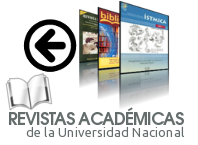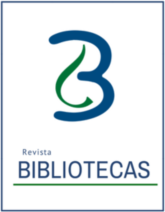Digital biomes in the Discord environment
DOI:
https://doi.org/10.15359/rb.42-1.4Keywords:
Communities, Digital Biomes, Information Resources, Servers, SystemsAbstract
For the purposes of this text, digital biomes are conceptualized as a diversity of resources and communities based on information needs in the online digital context. The research work aims to describe the characteristics of digital biomes from the environment of two thematic sites created by enthusiasts, organizations and initiatives in Discord, in order to know what information resources are collected and used by online communities. Having as a theoretical framework a Luhmannian perspective due to the fact that it is a disciplinary reference to analyze the complexity of certain contexts that display partially visible dynamics. The research methodology has a digital nature with a qualitative approach focused on obtaining data. According to the results in the two thematic sites focused on the practice and learning of the English language, sections are presented where it is possible to find and share information resources that aim to respond to the information needs of users who access the sites. themes, known on Discord as servers.
References
Agustín, D. (1998). Diccionario Oxford-complutense de Biología. (Trad. D. Vázquez). Complutense.
Alercia, D. (2023). Bioma. https://www.definicionabc.com/medio-ambiente/bioma.php
Baraldi, C., y Giancarlo, C. (2017). Niklas Luhmann: education as a social system. Springer Nature.
Barrón, J. (2012). Una mirada a la violencia en las organizaciones vista desde la teoría de los sistemas. En A. Díaz. (coord.), El enfoque de la complejidad: diversas perspectivas (pp. 105-118). UNAM.
Bastis Consultores (2020). The Methodology of Research in the Digital Environment. https://online-tesis.com/en/the-methodology-of-research-in-the-digital-environment/
Bioma digital. (2015). Bioma digital. https://mx.linkedin.com/company/bioma-digital
Bioma Digital. (2021). Página de inicio. https://agenciabioma.com.br/
Biomas digital. (2020). Página de inicio. https://www.facebook.com/people/Biomas-Digital/100027924683587/?sk=photos
Borrás, L. (2004). Atlas básico de Geografía física. Parramón.
Caliandro, A., y Gandini, A. (2017). Qualitative research in digital environments: A Research Toolkit. Routledge.
Chayko, M. (2018). The Internet, digital media & techno-social life. SAGE.
Daintith, J. (1983). Diccionario de Biología. Editorial Norma.
Discord. (2023). Crea un espacio donde todo el mundo pueda encajar. https://discord.com/company
Discord. (2023). Página de inicio. https://discord.com/
Discord. (2023a). Find your community on discord. https://discord.com/servers
Discord. (2023b). English. https://discord.com/invite/english
Discord. (2023c). The English Hub. https://discord.com/invite/enghub
Discord. (2023d). 303: Facilitating Positive Environments. https://discord.com/moderation/1500000178101-303-facilitating-positive-environments
El comercio. (2023). Discord: ¿qué es, para qué sirve y cómo funciona la aplicación de mensajería gamer? https://elcomercio.pe/tecnologia/actualidad/discord-2023-que-es-para-que-sirve-y-como-funciona-la-aplicacion-de-mensajeria-gamer-claves-trucos-noticia/
Fontanillo, E. (1985). Diccionario de Biología. Anaya.
Foxet_E. (2021). El_bioma_digital. https://www.instagram.com/el_bioma_digital/
Gómez, R. (2002). Los países del mundo. Ediciones LANCIA.
Hernández, R., Fernández, C., y Baptista, M. (2010). Metodología de la investigación. McGraw-Hill.
Kozinets, R., Pierre-Yann, D., y Earley, A. (2014). Netnographic Analysis: Understanding Culture through Social Media Data. En U. Flick. (ed.), Sage Handbook of Qualitative Data Analysis (262-275). Sage.
Krieger, M. (2001). Sociología de las organizaciones: una introducción al comportamiento organizacional. Pearson Education.
Lawrence, E. (2014). Diccionario de Biología. Trillas.
Luhmann, N. (1995). Introducción a la teoría de sistemas. Universidad Iberoamericana.
Luhmann, N. (1998). Sistemas sociales: lineamientos para una teoría general. (Trad. S. Pappe y B. Erker). Universidad Iberoamericana.
Luhmann, N. (2020). Comunicación ecológica: puede la sociedad moderna responder a los peligros ecológicos. (Trad. M. Ornelas.). Universidad Iberoamericana.
Luhmann, N. (2020). Comunicación ecológica: puede la sociedad moderna responder a los peligros ecológicos. (Trad. M. Ornelas). Universidad Iberoamericana.
Medina-Orozco, L. (2022). Entornos digitales. Descripción de hábitos y tendencias de uso de las herramientas tecnológicas. Revista Investigium IRE: Ciencias Sociales y Humanas, 13(2), 124-137. https://doi.org/10.15658/INVESTIGIUMIRE.221302.09
Monkhouse, F. (1978). Diccionario de términos geográficos. Oikos.
Mucina, L. (2019). Biome: evolution of a crucial ecological and biogeographical concept. New Phytologist, 222(1), 97-114. https://nph.onlinelibrary.wiley.com/doi/full/10.1111/nph.15609
Ortiz, A. (2016). Niklas Luhmann: teoría emergente de los sistemas sociales. Distribooks editores.
Pierre, G. (1991). Diccionario de Geografía. (Trad. C. Bosch, E. García y C. Bravo). Akal.
Red-Discord Bot. (2023). About Virtual Environments. https://docs.discord.red/en/stable/about_venv.html
Riba, C. (2012). Recursos energéticos y crisis: el fin de 200 años irrepetibles. Ediciones Octaedro.
Thomas, D., y Goudie, A. (2000). The Dictionary of Physical Geography. Blackwell.
Torres, N. (1999). Introducción a la teoría de sistemas de Niklas Luhmann. En S. Ramírez (Coord.), Perspectivas en las teorías de sistemas (pp. 51-61). Siglo XXI.
Whittow, J. (1988). Diccionario de Geografía física. (Trad. B. Tello y R. Torcal). Alianza.
Downloads
Published
How to Cite
Issue
Section
License

This work is licensed under a Creative Commons Attribution-NonCommercial-ShareAlike 4.0 International License.
Bibliotecas provide immediate open access to their content, based on the principle of facilitating research to the public free of charge and free of charge to promote the global exchange of knowledge.
The journal Bibliotecas is a publication hosted by a public higher education institution, which is supported by public resources. Since its inception, the magazine has offered all its contents free of charge without any restriction on the rights of: reading, downloading and printing in full text. Works published in libraries may be analyzed, quoted and reproduced in whole or in part, mentioning the original source.
The journal Bibliotecas is licensed under the Creative Commons Attribution - Non-Commercial - Share Equal, 4.0 International license; therefore, it is allowed to: share, copy and redistribute the material in any medium or format.

Este obra está bajo una licencia Creative Commons Atribución-NoComercial-CompartirIgual 4.0 Internacional.








